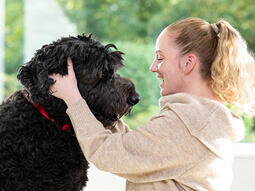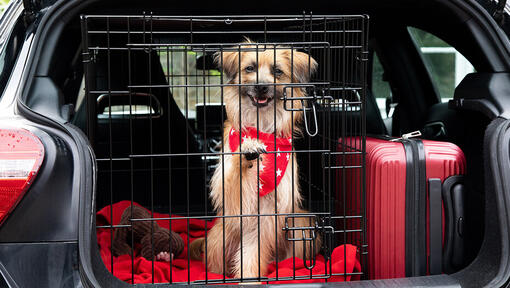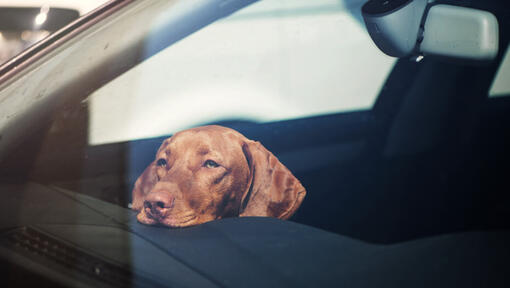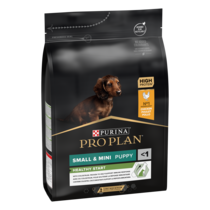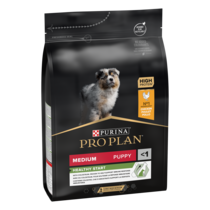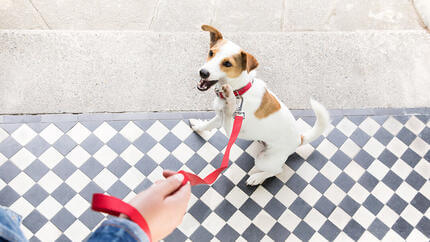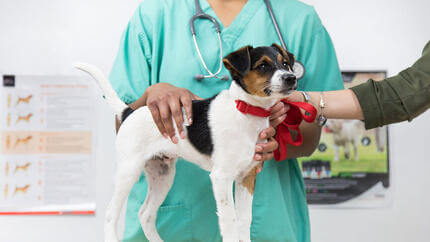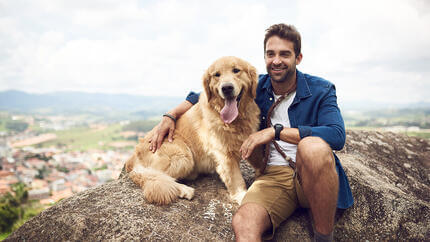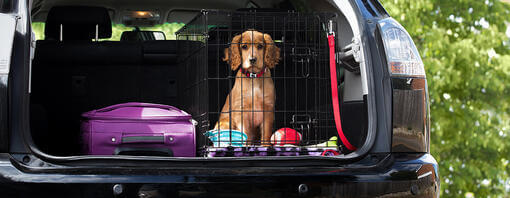

Turn your new puppy into an excellent travel companion.
You’ve got a new pup and you can’t wait to show them the world. We know the feeling! But before you start planning that amazing road trip together (or even getting ready to drive to the vet’s), you have to remember that a car can be a very strange thing to a puppy. The closed space, the car movement and even the engine sound can trigger alarm bells for a puppy not used to travelling. But there are a few things you can do to make car trips easier to bear for your pup. Who knows, maybe they will even start looking forward to them! Here are the basics of car travelling for puppies.
Can puppies travel in the car?
Yes, puppies can travel in cars, but different dogs will get different experiences out of it.
While some puppies bound in and out of cars without a care in the world, others find car travel a little nerve-wracking. Thankfully, there are many things you can do to make your four-legged friend feel more comfortable.
How to teach a puppy to ride in a car
When taking your dog in a car the secret is to make them feel confident. The more confident they are, the more comfortable and less stressed they’ll be. As with so many things with dogs, the sooner they experience travel, the better. Ideally, you want your puppy to get used to cars as soon as you bring them home.
Start with them sitting in a stationary car. They need time to have a sniff around the pen or area they will be confined to and feel comfortable before you start the engine. Once they’re happy, move on to the next step.
Drive together to the end of the road and back. Give them praise and rewards at the end of the journey for riding quietly in the car.
The foot well or boot is actually better for puppies to sit in than on your car seat. They'll find the journey easier if they have somewhere comfortable to sit and lie down, especially as you go around corners.
Assuming all goes well, you simply go on longer or more frequent trips as your puppy’s confidence grows. Be slow and patient and you should soon start to make progress.
How to keep your puppy safe while travelling in the car
Dog car safety isn’t just about keeping your puppy protected; it’s about taking care of the driver and passengers too.
Take time to train your puppy to be calm and quiet in the car so they don’t distract the driver or cause a nuisance to other people in the car.
Use a crate or a dog barrier
If your puppy is sitting in the foot well or boot, use a crate or dog barrier to keep them safely contained. If this isn’t possible and your only option is to have your puppy sitting on a car seat, make sure they’re wearing a harness. Harnesses are like dog seat belts; they come in different sizes and attach onto ordinary car safety belts. A harness can take a bit of getting used to so you might want to give it a trial run in the house first, giving your dog lots of praise for wearing it, before you use it for real on your journey.
Don’t let your puppy travel in the car with the head out the window
It might look like great fun, and probably is, but if you do it too much they could get an eye irritation or, worse, get injured by something you drive past. There’s also the risk that they could slip out of their harness and jump out of the window. It’s absolutely fine to open the window a little bit so your dog gets plenty of fresh air, and on hot days you can use a window guard that lets you open the window more without allowing your dog the chance to jump out.
Hot weather precaution
If the weather’s hot you can also buy shades that attach to the windows to prevent strong sunlight coming in. Both the window guards and the sunshades are great for when you’re moving but even with the windows down and the sunlight protected, cars can heat up very quickly. NEVER leave your dog in the car on warm days, even in the winter, as it can be fatal.
Include frequent breaks for long car journeys
If you’re going to be travelling with your dog over long distances, make a habit of stopping every couple of hours. You’ll probably both appreciate a toilet break, a drink of water and the chance to stretch your legs – just always ensure that your puppy is wearing their collar and ID in case they escape.
What to do if your puppy is anxious about car travel
If your puppy gets particularly nervous in the car ask your vet about using synthetic pheromones which are available in different formats – including dog bandanas! The scents are believed to be similar to the reassuring pheromones that mum will have emitted naturally when they were a puppy, so it should calm them down and keep them relaxed for around four hours.
Also try to provide them with some kind of familiarity in the car to make them less stressed, such as a favourite toy or a rug that smells like home. This is especially helpful for young puppies.
Car sickness in puppies
Car sickness in puppies is very common although some dogs do grow out of it. If your furry friend gets queasy in cars it makes sense to put down waterproof sheeting where they tend to sit or lie and always carry lots of paper towels and a cleaning spray in case they’re ill.
A car sick puppy is an unhappy puppy – and no one wants that – so don’t travel when they’ve got a full stomach. It’s best to hold off feeding your dog for two to three hours before you travel as a precaution and always give your dog a walk just before you set off so they’re not anxious about having an accident. If car sickness becomes a frequent problem, ask your vet for their advice.
Remember to be patient and aim for gradual progress. Soon your puppy will become familiar with the car and know what to expect when they hear the door shut and the engine running - a great journey with a travel companion they love and plenty of off-key sing-alongs.
Discover more useful guides for welcoming your new pup home and make sure you’ve got all the basics right from vaccinations to neutering and puppy microchipping.
